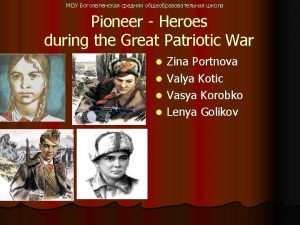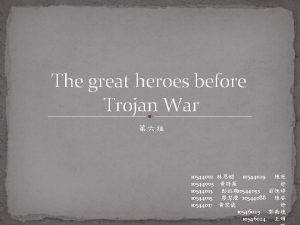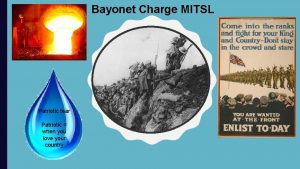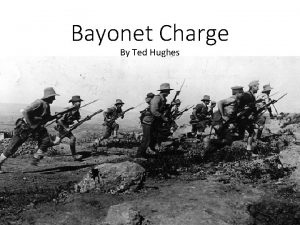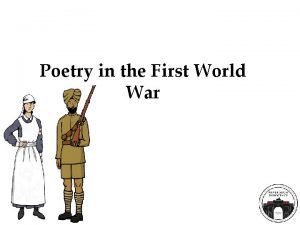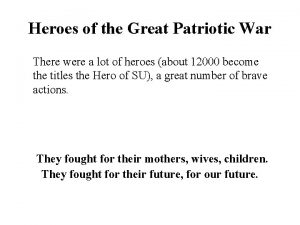Pioneer Heroes during the Great Patriotic War Zina










- Slides: 10

МОУ Богоявленская средняя общеобразовательная школа Pioneer - Heroes during the Great Patriotic War Zina Portnova l Valya Kotic l Vasya Korobko l Lenya Golikov l

Zina Portnova

Pioneer-Heroes Zina Portnova l l The number of the Obol youth underground organization got together near a tall watchtower in the forest about five hundred metres away from the small village of Ushuli. Suddenly one of the members saw a strange little girl walking towards them and said: “Look, she’s coming over to us. Who is that girl”? Fruza Zenkova, secretary of the underground committee, only smiled answered: “That’s Zina Portnova. She wants to join us”. “I’m afraid we’ll have a lot of bother with that girl, the secratory said in a low voice as she looked at the girl’s slender figure. “She looks so young to work with us”. And she asks the girl to tell them about herself.

I’m from Leningrad. I came to Byelorussia during the school holidays to see my grandmother. When the war began, we couldn’t get back home to Leningrad. I live in the village of Zuyi. I have passed into the 8 th form. You may wonder what has brought me here to you. I know what you are thinking. You think I’m too small and can’t do anything useful. But that’s a mistake. I see and understand everything. The Nazis kill our people. But I want to live only without Nazis. I hate them very much.

Zina Portnova At last Zina became a real member of the underground organization. The partisans in the forest wanted to know everything about the German troops in the local garrison. The first job she got was to hand out leaflets and newspapers to the people living in nearby villages. She did that together with her brother Ilya. They wanted as many people as possible to read the papers. Then she was told to find out how large the garrison was. And she has done this work with a great success.

Zina Portnova Several months went by. Zina had changed a lot. She now looked quite a grown-up girl and everyone saw she was a very helpful member of the underground organization. At Obol there was a special school where nazi officers went for refresher training courses. So the underground organization decided to give them some more awards – to “present” them with wooden crosses. Zina has managed to get a job there. She had to work hard and often felt very tired. The German started to pay attention to the cheerful young Russian girl. They were pleased that she was able to do all the hard jobs like fetching firewood and water, cleaning tables and sweeping floors.

The chance came on the day Zina had to work as woman The chance came on the day Zina had to work as dish-washer. The woman who usually did the washing-up had fallen ill the day before. But the chief cook and his assistant kept their eyes on her all the time. Nothing could be done just before breakfast-time, so she decided to wait until dinner-time came. At last the German officers started coming into the hall. They all sat down and dinner began. Zina was waiting for a chance to be left alone in the kitchen and drop the poison into one of the pans. One of the girls brought a beefsteak to a German officer. The meat was so tough that he could not eat it. It made him very angry and he called a chief cook. That was the very moment Zina was waiting for. More than 100 nazi officers died that day.

Zina Portnova Several months went by and commander of the partisan detachment sent Zina to get in touch with those members of the youth organization who remained alive. On her way back to the forest she was stopped and taken to the Obol Gestapo for questioning. “What’s your name? , asked a German lieutenant. “Maria Kozlova. I work in a brickyard, ” the girl answered. “Well, Maria Kozlova”he said and a minute later he returned followed by deserter Grechukhin. The traitor looked at the girl and said, “Zinaida Portnova, when did you change your name? ”

Zina was taken to a special room for interrogation and it was a different officer who spoke to her. When he came in, he was very surprised to find a small, slender young girl who looked almost a child. The nazi officer changed his tone. At first it had sounded rather dry and formal, but now it became gentle and kind. Then he told one of the soldiers to take the girl to a room in the Gestapo, not to a prison cell, and to fetch her some dinner, some white bread and some sweets. Next day nazi captain started to question the girl again. But Zina kept silent. The German became furious with anger. He raised his arm and struck her on the chest. Suddenly he heard the sound of a car outside the building. He went to the window to see who had come. Zina seized the revolver and the German who had no time to act. Zina fired at him and he sank to the floor.

l Zina dashed out of the room. She was only thinking of how quickly she could get to a big forest. She knew that the distance was not too great, but it would be some minutes before she was out of danger. A number of German soldiers were already chasing her. She shoot one of them, but the revolver would not fire. There were no more cartridges in it. She was shot near a small pine-tree on a cold January morning in 1944. So, it was that her short life closed. Zina Portnova became Hero of the Soviet Union. Her life became a subject for poets and writers and a monument was set up in her memory not far from the place where she fought against the Nazis.

